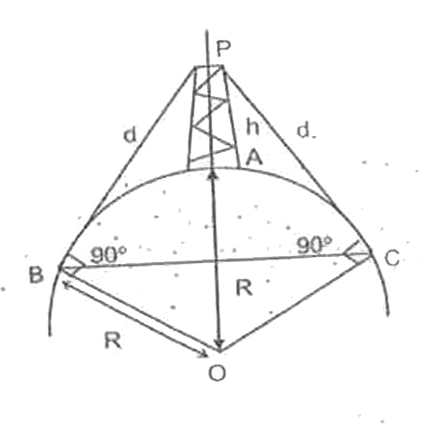Assertion: The television signals are propagated through sky waves. ltbr> Reason: Television signals have freqeuncy in the range of 1000MHz to 2000MHz range.
The correct Answer is:D
As television signals being of frequency 100 MHz to 200 MHz cannot be reflected by ionosphere but they penetrate it, so they not propagated through sky waves, in fact, television signals are propagated through space wave propagation.
Topper's Solved these Questions
- BOOK - NCERT FINGERTIPSCHAPTER - COMMUNITCATION SYSTEMSEXERCISE - Detection Of Amplitude Modulation Wave12videos
COMMUNITCATION SYSTEMS
- BOOK - NCERT FINGERTIPSCHAPTER - COMMUNITCATION SYSTEMSEXERCISE - HOTS10videos
COMMUNITCATION SYSTEMS
- BOOK - NCERT FINGERTIPSCHAPTER - COMMUNITCATION SYSTEMSEXERCISE - NCERT Exemplar18videos
COMMUNITCATION SYSTEMS
- BOOK - NCERT FINGERTIPSCHAPTER - ATOMS EXERCISE - Assertion And Reason15videos
ATOMS
- BOOK - NCERT FINGERTIPSCHAPTER - CURRENT ELECTRICITYEXERCISE - Assertion And Reason15videos
CURRENT ELECTRICITY
Similar Questions
How the television signals are propagated, derive the formula for the area that a T.V. signal will cover
 View Solution
View SolutionPropagation of radio waves The behaviour of electromagnetic waves of wavelength10−3 m and higher (called radio waves) in their propagation through atmosphere is an important consideration in all modern forms of communication, radio, television, microwaves, etc. At low frequencies, radio waves radiated by an antenna near the earth travel directly following the surface of the earth. This is called wave-along-ground propagation.
Radio waves of frequencies 2 MHz-20 MHz are reflected off the ionosphere. So, radio waves in this frequency range radiated from a certain point can be received at another point on the surface after being reflected by the ionosphere. This is known as skywave propagation.
Television signals have frequencies in the 100-200 MHz range and penetrate ionosphere (no reflection), therefore, their propagation is not possible through sky waves. The reception of such waves is possible only if the receiver antenna directly intercepts the signals. Thus, television broadcasts are made from tall antenna to get larger coverage. This is known as space wave propagation. Answer the following questions.
What is the frequency range of television signals?View Solution
Knowledge Check
- Question 1 - Select One
Statement-1: Television signals are propagated through sky waves.
Statement-2 : Television signals have frequency in the 100-200 MHz range.AStatement-1 is true: Statement-2 is true, and Statement-2 is correct explanation of Statement-1.BStatement-1 is true, Statement-2 is true, but Statement-2 is not a correct explanation of Statement-1.CStatement-1 is true, but Statement-2 is false.DStatement-1 is false, but Statement-2 is true. - Question 2 - Select One
Assertion: Television signals are recieved throgh sky-wave propagation.
Reason: The ionosphere reflects em wave of frequencies greater than a critical frequency.AIf both the assertion and reason are true and reason is a true explantion of the assertion.BIf both the assertion and reason are true but the reason is not true the correct explantion of the assertion.CIf the assertion is true but reason falseDIf both the assertion and reason are false. - Question 3 - Select One
Radio waves with frequencies higher than television signals are
Aultrasonic wavesBsound wavesClight wavesDmicrowaves
Propagation of radio waves The behaviour of electromagnetic waves of wavelength10−3 m and higher (called radio waves) in their propagation through atmosphere is an important consideration in all modern forms of communication, radio, television, microwaves, etc. At low frequencies, radio waves radiated by an antenna near the earth travel directly following the surface of the earth. This is called wave-along-ground propagation.
Radio waves of frequencies 2 MHz-20 MHz are reflected off the ionosphere. So, radio waves in this frequency range radiated from a certain point can be received at another point on the surface after being reflected by the ionosphere. This is known as skywave propagation.
Television signals have frequencies in the 100-200 MHz range and penetrate ionosphere (no reflection), therefore, their propagation is not possible through sky waves. The reception of such waves is possible only if the receiver antenna directly intercepts the signals. Thus, television broadcasts are made from tall antenna to get larger coverage. This is known as space wave propagation. Answer the following questions.
Television signals travel through ___________ propagation.View SolutionPropagation of radio waves The behaviour of electromagnetic waves of wavelength10−3 m and higher (called radio waves) in their propagation through atmosphere is an important consideration in all modern forms of communication, radio, television, microwaves, etc. At low frequencies, radio waves radiated by an antenna near the earth travel directly following the surface of the earth. This is called wave-along-ground propagation.
Radio waves of frequencies 2 MHz-20 MHz are reflected off the ionosphere. So, radio waves in this frequency range radiated from a certain point can be received at another point on the surface after being reflected by the ionosphere. This is known as skywave propagation.
Television signals have frequencies in the 100-200 MHz range and penetrate ionosphere (no reflection), therefore, their propagation is not possible through sky waves. The reception of such waves is possible only if the receiver antenna directly intercepts the signals. Thus, television broadcasts are made from tall antenna to get larger coverage. This is known as space wave propagation. Answer the following questions.
What is wave-alongs-ground propagation?View SolutionAssertion : It is necessary to use satellites for long distance T.V. transmission.
Reason : The television signals are low frequency signals.View SolutionThe radio waves of frequency ranging from 2 MHz to 30 MHz are called
View SolutionAssertion: The Microwave propagation is better than the sky wave propagation.
Reason: Microwaves have frequency 100 to 3001 GHz, which have very good directional properties.View Solution

